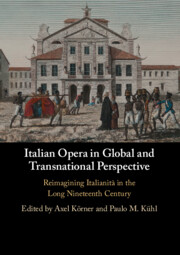 Italian Opera in Global and Transnational Perspective
Italian Opera in Global and Transnational Perspective Franchetti’s and Leoncavallo’s Operas on German Myths
Published online by Cambridge University Press: 17 March 2022
The chapter examines Alberto Franchetti’s Germania, written primarily for the Italian opera market and premiered at the Teatro alla Scala in Milan (1902); and Ruggero Leoncavallo’s Der Roland von Berlin, commissioned by the German Emperor Wilhelm II to celebrate the Hohenzollern dynasty, and premiered at the Berlin court opera in 1904. Starting with a brief summary of the two operas’ origins and plots, the chapter illustrates how in both cases operatic italianità was used to represent German national myths. Conventional concepts of operatic italianità were challenged through musical references to German folk songs. German critics employed generic meanings of italianità to articulate their disdain at these 'foreign' depictions of national identity, claiming an exclusive right for German composers to write on patriotic topics. As a consequence, productions of Franchetti’s and Leoncavallo’s works in Imperial Germany provoked some of the most hostile reactions ever articulated against Italian composers during the years before World War I. Furthermore, the defamation of Leoncavallo included a barely concealed criticism of the emperor himself.
To save this book to your Kindle, first ensure [email protected] is added to your Approved Personal Document E-mail List under your Personal Document Settings on the Manage Your Content and Devices page of your Amazon account. Then enter the ‘name’ part of your Kindle email address below. Find out more about saving to your Kindle.
Note you can select to save to either the @free.kindle.com or @kindle.com variations. ‘@free.kindle.com’ emails are free but can only be saved to your device when it is connected to wi-fi. ‘@kindle.com’ emails can be delivered even when you are not connected to wi-fi, but note that service fees apply.
Find out more about the Kindle Personal Document Service.
To save content items to your account, please confirm that you agree to abide by our usage policies. If this is the first time you use this feature, you will be asked to authorise Cambridge Core to connect with your account. Find out more about saving content to Dropbox.
To save content items to your account, please confirm that you agree to abide by our usage policies. If this is the first time you use this feature, you will be asked to authorise Cambridge Core to connect with your account. Find out more about saving content to Google Drive.